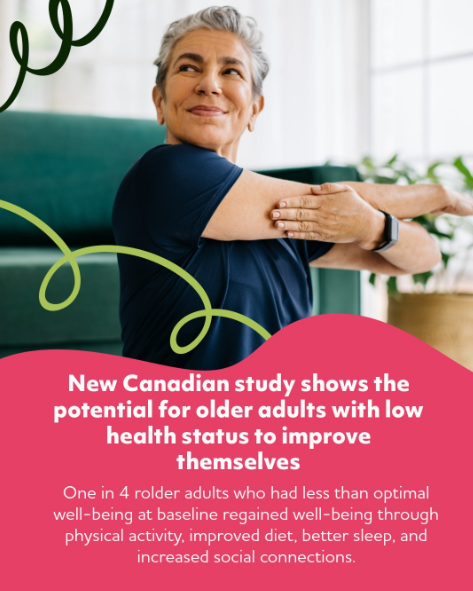
Can older adults bounce back from poor health and well-being?
A new study published in PLOS ONE says yes—and the findings are both hopeful and actionable for those working in geriatric care.
Researchers analyzed data from over 8,000 older adults in the Canadian Longitudinal Study on Aging (CLSA) who were not in optimal well-being at the start of the study. Three years later, nearly one in four had regained a state of optimal well-being. That’s a powerful reminder: aging doesn’t have to mean inevitable decline.
🔍 What Is “Optimal Well-Being”?
In this study, optimal well-being meant more than just the absence of disease. It included:
- Adequate social support
- Positive self-perception of aging
- Good physical and mental health
- Freedom from disabling pain, cognitive decline, or limitations in daily activities
🧠 Key Factors That Helped Older Adults Reclaim Wellness
The study found that individuals who were:
- Younger (within the 60+ cohort)
- Married
- Physically active
- Non-smokers
- Not obese
- Free from chronic conditions like diabetes, arthritis, and osteoporosis
- Financially stable
- Without sleep problems
…were significantly more likely to regain optimal well-being. Importantly, those who had strengths in at least two of the four wellness domains—physical, psychological/emotional, social, and self-rated wellness—had better outcomes. [journals.plos.org]
💬 Why This Matters for Geriatric Care
This research challenges the narrative that aging is a one-way street toward decline. It shows that wellness is dynamic, and with the right supports, older adults can recover and thrive—even after setbacks.
For geriatric professionals, caregivers, and policy advocates, this means:
- Investing in programs that promote physical activity and social connection
- Screening for sleep issues and mental health concerns
- Supporting lifestyle changes that reduce chronic disease risk
- Creating environments that foster purpose and self-worth in aging
🌟 Dakota Geriatrics Takeaway
At Dakota Geriatrics, we believe in the resilience of older adults. This study reinforces our commitment to holistic, person-centered care that sees aging as a journey—not a destination.
Let’s continue to build systems that help older adults not just live longer—but live well.
